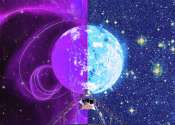Saturday Citations: Scientists study monkey faces and cat bellies; another intermediate black hole in the Milky Way
This is not a rerun of last week's roundup; another group of astronomers found a second intermediate-mass black hole in the Milky Way and I can't avoid highlighting it. They're cool! They may have formed in the primordial ...









